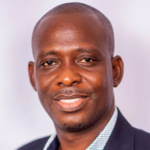Department/Unit: Computer Science and Engineering Department
Qualifications: BSc Information Systems and Technologies; MSc Information Systems and Technologies; PhD Computer Science and Engineering Professional Member, Institution of Engineering and Technology (IET), Ghana; Professional Member, Institute of Electrical and Electronics Engineers (IEEE) Member, International Association of Engineers (IAEng)
PhD Institution: University of Mines and Technology
PhD dissertation title: Data-Driven Assessment of Impacts and Interactivities of Socio-Economic HIV Drivers – A Case Study of Ghana
Current research interests and projects: Data Analytics, Logic of Computer Science, Expert Systems, and Fuzzy Logic
Selected publication 1: Deho, O. B. and Agangiba, W. A. (2019), “Sentiment Analysis with Word Embedding: The Case of Double-track Education System in Ghana”, Ghana Journal of Technology, Vol. 3, No. 2, pp. 51 - 57.
Selected publication 2: Deho, B. O, Agangiba, W. A., Aryeh, F. L. and Ansah, J. A. (2018), "Sentiment Analysis with Word Embedding", 2018 IEEE 7th International Conference on Adaptive Science & Technology (ICAST), Accra, 22nd to 24th August 2018, pp. 1-4.
Selected publication 3: (i) Agangiba, M. A., Nketiah, E. B. and Agangiba W. A. (2017), “Web Accessibility for the Visually Impaired: A Case of Higher Education Institutions’ Websites in Ghana”. International Conference on Web-Based Learning (pp. 147-153). Springer, 20-22 September 2017, Cape Town, South Africa
Selected publication 4: Umaru, Y. M, Agangiba, W. A., Mensah, S., (2021), "Real-Time Monitoring and Control Covid-19 Disinfection System with Access," Proceedings of IEEE 8th International Conference on Adaptive Science & Technology (ICAST), Accra, 24th to 26th November 2021
Selected publication 5: Agangiba, W. A. and Agangiba, M. (2013), “Mobile Solution for Metropolitan Crime Detection and Reporting”, Journal of Emerging Trends in Computing and Information Sciences, Vol. 4, No. 12, December 2013, pp. 916-921
Selected publication 6: Agangiba, W. A, Kontoh, M. S and Ansah, A. K. (2013) “E-governance public key infrastructure (PKI) model” , Internatioal Journal of Electronic Governance, Vol. 6, No. 2, pp. 133-142
Selected publication 7: Agangiba, W. A., Agangiba, M. and Okai, G. E. Y (2022), “Computational Modeling and Assessment of Acceptance Level of Virtual Learning Platforms”, International Journal of Computer Applications Vol. 184 No. 12, pp. 49-54, May 2022.
Selected publication 8: Botchway, I., Alese, B.K. and Agangiba, W.A., (2021), “Evaluation of e-government applications based on ISO/IEC 9126 model”, Annals Computer Science Series, vol. 19, No. 1.
Selected publication 9: Agangiba, W. A. and Agangiba, M. (2019), “Assessing the Impact of Socio-Economic HIV Driving Factors in Ghana: Rural Versus Urban”, Ghana Journal of Technology, Vol. 3, No. 2, pp. 42 - 50.
Selected publication 10: Odjidja, E., Kabanda, S., Agangiba, W. and Annan, R. (2018). “Wireless Voip Implementation Using Asterisk Pbx And Open Source Softphone”, In: TREE 2018 - EAI International Conference on Technology, R&D, Education and Economy for Africa, Abijan, 21st to 22nd March, 2018, pp.1-9.
Capstone assignment title: Successes and Challenges in using Technology for Doctorate Supervision: The case of Distance and Part-time Candidates in University of Mines and Technology, Tarkwa
Capstone assignment abstract: The doctorate is an advanced academic degree which is usually executed within a period of three (3) to five (5) years in many jurisdictions. To obtain a doctorate, the candidate is normally required to conduct original research under supervision of senior academics. The status of a doctoral candidate can either be fulltime, part-time or distance. By design, Distance and Part-time doctoral models come with diverse challenges. There exist a variety of modern technologies which could support online learning in the context of doctoral studies. Though such technologies are usually designed to meet specific functions of the learning model, certain challenges could arise as a result of their use. Such problems could be technical or socio-emotional. This study is poised to identify specific technological challenges faced by PhD candidates and their supervisors in the university of Mines and Technology (UMaT), Tarkwa, Ghana. UMaT is a relatively young university with a well-designed Postgraduate Programme in Mining Engineering, Minerals Engineering, Geological Engineering, Geomatics Engineering, Mechanical Engineering and Mathematics.




